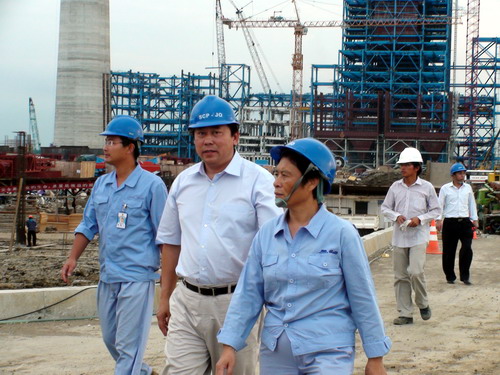Chinese firms power on with Indonesia plan
Updated: 2011-10-18 11:40
By Du Juan (China Daily)
|
|||||||||||
|
Li Nengzhi (right), director of the Indramayu project, and Zhao Ruolin (middle), president of China National Electric Engineering Co Ltd, at the construction site. [Photo/ China Daily] |
JAKARTA - Chinese companies are likely to continue to participate in Indonesia's second 10,000 megawatt (mW) national power development plan, following a record of successful cooperation during the first program, said officials and corporate leaders from both countries.
"It is very likely that we will continue to cooperate with Chinese companies on the projects for the second power program," said Dahlan Iskan, president director of PT Perusahaan Listrik Negara (PLN), the Indonesian state-owned power utility and also the owner of the first power plan's projects.
"Indonesia still has a power shortage of 35,000 megawatts."
Nine out of 10 projects in Indonesia's first fast-track power program are managed by Chinese consortia or companies, according to Zhang Weidong, executive vice president of the China Export & Credit Insurance Corp (Sinosure).
He said as a State policy financial organization, Sinosure has been leading financing negotiations involving many power plants, amounting to $4 billion, and the company plans to expand cooperation with the Indonesian government and local companies.
Zhang also said that some Chinese companies are holding talks with Indonesian officials and companies to develop the second power program. "They may invest, build and operate these power plants, becoming a shareholder instead of merely a contractor," he said.
The first large-scale power plant built under the first program with Chinese participation in Indonesia was completed on Oct 12. That plant will greatly ease electricity shortages in the region, said Coordinating Minister of Economy Hatta Rajasa.
The Indramayu coal-fired plant in West Java was one of the earliest projects in the 10,000 mW fast-track power construction program created by the Indonesian government to ease local electricity shortages.
The project was started in 2007 in Indramayu, West Java. The owner is PLN and the contractor is a consortium composed of China National Machinery Industry Co Ltd (Sinomach), China National Electric Engineering Co Ltd (CNEEC) and an Indonesian local company.
Ren Hongbin, chairman of Sinomach, said the company sees Indonesia as a strategic market and plans to expand its business in the country.
"We have participated in many local infrastructure projects in Indonesia in recent years," said Ren.
The project is a successful example of the overseas business model of Sinomach and also a turning point in CNEEC's overseas development, said Zhao Ruolin, president of CNEEC, the company in charge of the completion of the project.
"We are not only focusing on particular projects but also the potential of the market here," said Zhao. "We have given much respect and importance to the local people's faiths and habits. We built a mosque near the power plant for the local workers to pray conveniently."
Rajasa said the project is "the best energy project in the Indonesian power plant construction history so far".
He said the government plans to ensure every island in Indonesia has sufficient power supply by the end of 2014, which will require an annual increase in capacity of 3,000 mW.
The Indonesian 10,000 mW power plant program is a good example of bilateral cooperation. The completion of the first project has shown the competitiveness of China's equipment manufacturing and engineering technology, said Wang Shengwen, deputy director of China's Ministry of Commerce.
He said that Chinese companies should make full use of the business opportunities created by the China-ASEAN Free Trade Area and increase investment in Indonesia.
"The Chinese government will keep supporting domestic companies to participate in infrastructure construction including roads, bridges, harbors, power plants and the communications sector in Indonesia," said Wang. "Meanwhile, we hope that the Indonesian government can provide policy support to Chinese companies for more investment."
According to the ministry, bilateral trade has grown by an average of 22.8 percent annually since 2000. In 2010, bilateral trade reached $42.75 billion. More than 1,000 Chinese companies have established factories in Indonesia with a total investment of more than $6 billion.














